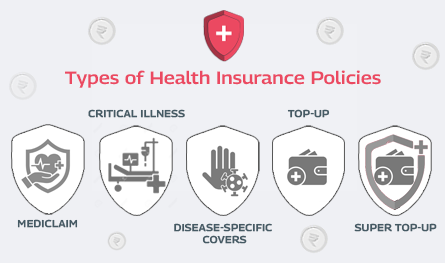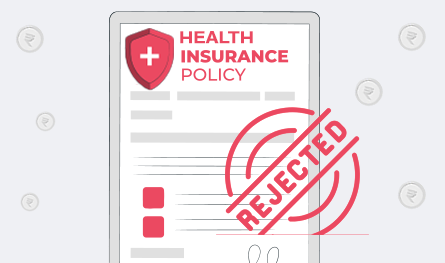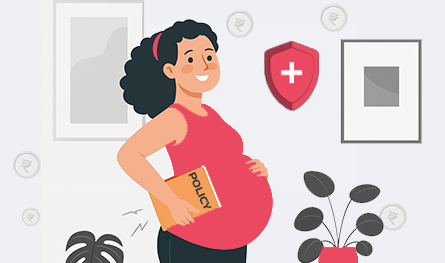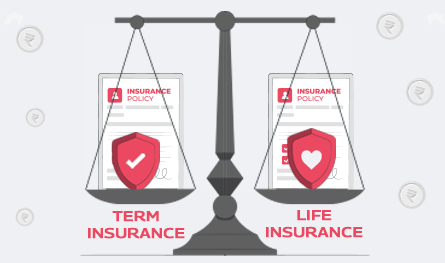Related Articles
 Jan 08, 2025
Jan 08, 2025
Is Varicose Vein surgery covered under the health insurance policy in India
 Health Insurance
Health Insurance

Life is often filled with uncertainties over which we have little to no control. The best we can do is to keep ourselves prepared to handle any type of crisis smoothly. Let’s take one step at a time and start by purchasing a robust health insurance plan that promises to cover medical emergencies in exchange for minimal premium payments.
Purchasing health insurance can be overwhelming due to the numerous types of plans and their varying levels of coverage. Let’s learn about the different types of health insurance policies.

Here’s a detailed list of different types of health insurance policies that you can choose from depending on your age, medical needs and responsibilities:
An individual health insurance plan, as its name suggests, is a reliable option for individuals who wish to obtain medical coverage for themselves and their spouses or children.
This type of plan is typically available for individuals aged between 18 to 65 years.
Each member under the plan is insured individually.
The sum insured under this plan is separate for each member.
These plans usually offer coverage against medical needs like pre- and post-hospitalisation expenses, room rent, day care treatment, medicines etc.
As the name suggests, a family health insurance plan is designed to offer coverage for the entire family, including spouses, children, parents, grandparents and other dependent family members.
A family floater plan covers all the insured members under the same policy.
Typically, the premium is decided based on the age of the eldest insured member.
The sum insured is shared and it can be utilised by every insured member.
A senior citizen health insurance plan is typically designed for individuals aged 60 years or above. This type of plan is ideal for elderly members of the family who are more vulnerable to health challenges. The plan offers specific coverage depending on the needs of senior citizens, and the premium is based on the individual's medical history and age.
A group health insurance plan is typically a type of medical insurance offered by employers or organisations to their employees. This type of health insurance, though, varies from plan to plan, but often comes with a limited sum insured and coverage. However, the insured has the liberty to add family members by paying an additional premium.
Note: Group health insurance offered by an organisation or the employer gets terminated as soon as you leave the organisation.
Apart from the above-mentioned health insurance plans, which are designed to offer comprehensive coverage, some plans cater to your specific medical needs. Here are some specific health insurance plans that you should know about:

Paybima Team
Paybima is an Indian insurance aggregator on a mission to make insurance simple for people. Paybima is the Digital arm of the already established and trusted Mahindra Insurance Brokers Ltd., a reputed name in the insurance broking industry with 17 years of experience. Paybima promises you the easy-to-access online platform to buy insurance policies, and also extend their unrelented assistance with all your policy related queries and services.

.png)
In India, you have to get compulsory Personal Accident Cover for owner . However, whether you buy it with your car insurance or not is optional.


You finally did it. You filled out the forms, declared every ache and allergy, double-checked your documents, and hit submit. You even gave yourself a pat on the back. But just when you thought you were all set, the health insurance company says no. It stings, doesn’t it?
Before you start questioning your entire medical history or feel like you’ve failed some secret exam, please note that a rejection isn’t a dead end. It’s just a detour. In fact, it’s more common than you think. Insurers look at risk, numbers, and the fine print you probably didn’t enjoy reading. The good news? You’re not powerless here. If your health insurance proposal got turned down, this guide is your recovery plan. You’ll find out why it happened, what to do next, and how to get yourself back in the approval zone.


Let’s be honest. Health insurance terms sound like they were made up just to confuse you. You keep hearing about deductibles, copays, and premiums, and it all feels like financial gibberish.
But here’s the thing. These words are actually the keys to understanding how your health insurance plan really works. Once you crack the code, you will know exactly what you are paying for and what you will get in return. No more surprises at the hospital or blank stares during claim conversations. So, let’s dive deeper into the jargon and break it all down for you.


You've sorted the nursery. The list of baby names is getting longer and longer. And at 2:00 a.m., you're excitedly reading online reviews about a baby stroller. Well, that's how excited usually parents-to-be are. But amidst all the planning and excitement, here is the question that individuals may sometimes overlook: Will your health insurance cover all this?


Insurance decisions can be confusing. Especially, when you're staring at two plans that sound almost identical but do very different things. Term insurance promises high coverage at a low price, but no money back if you survive. Life insurance, on the other hand, may come with savings, returns, and bonuses, but it often comes at a higher cost.
So, which one should you pick? The one that protects your family? Or the one that also helps you save for the future? Let’s break it down in simple terms so you can choose the one that actually works for you.
